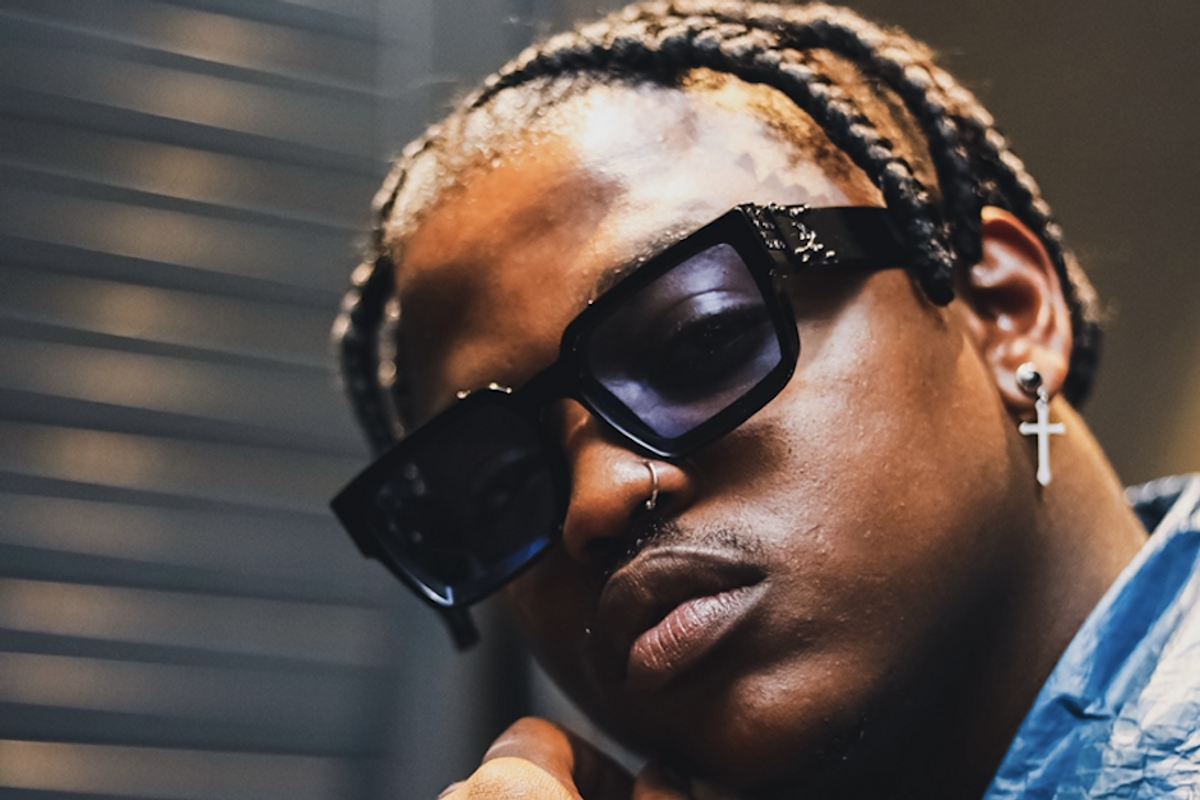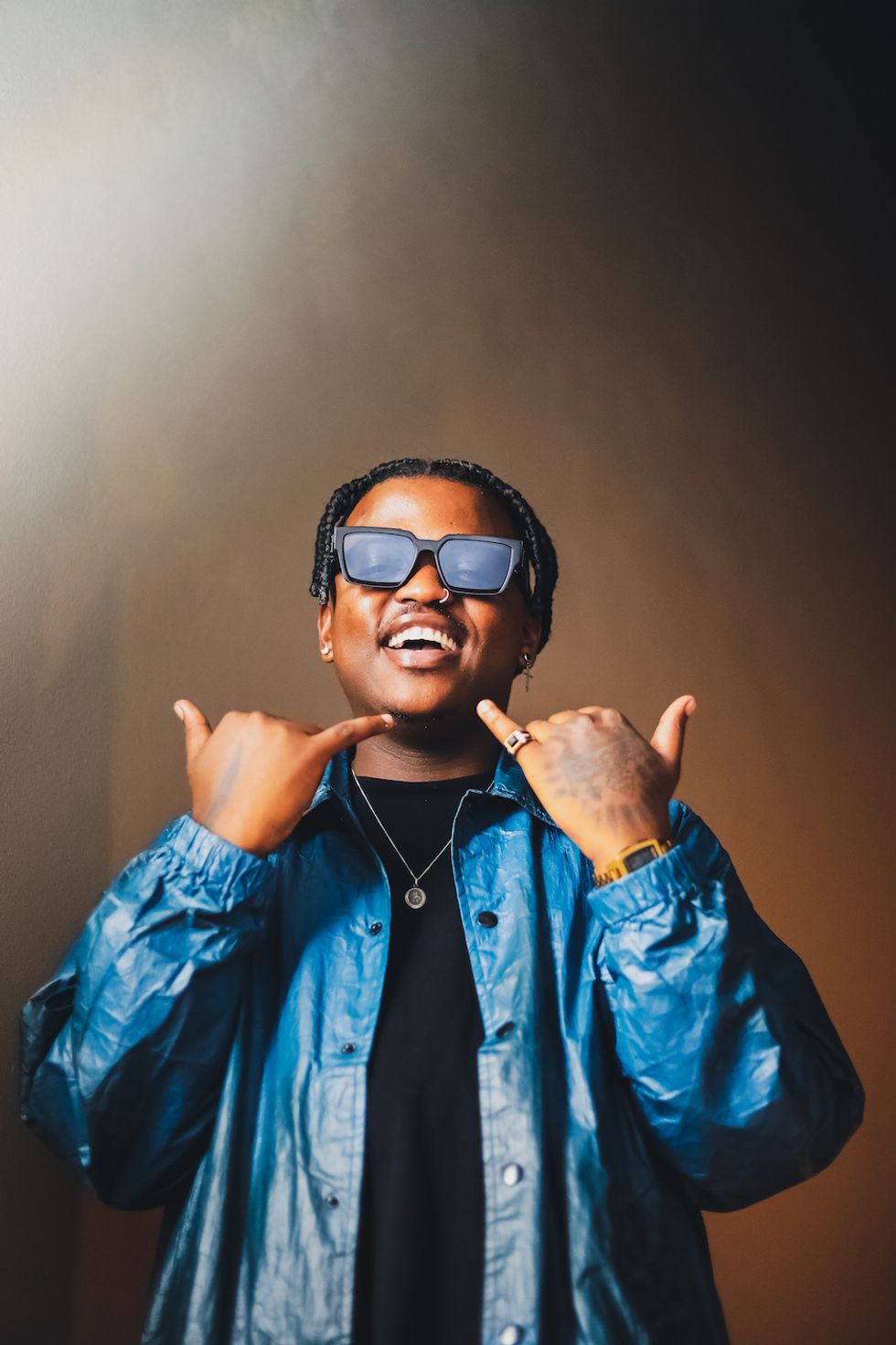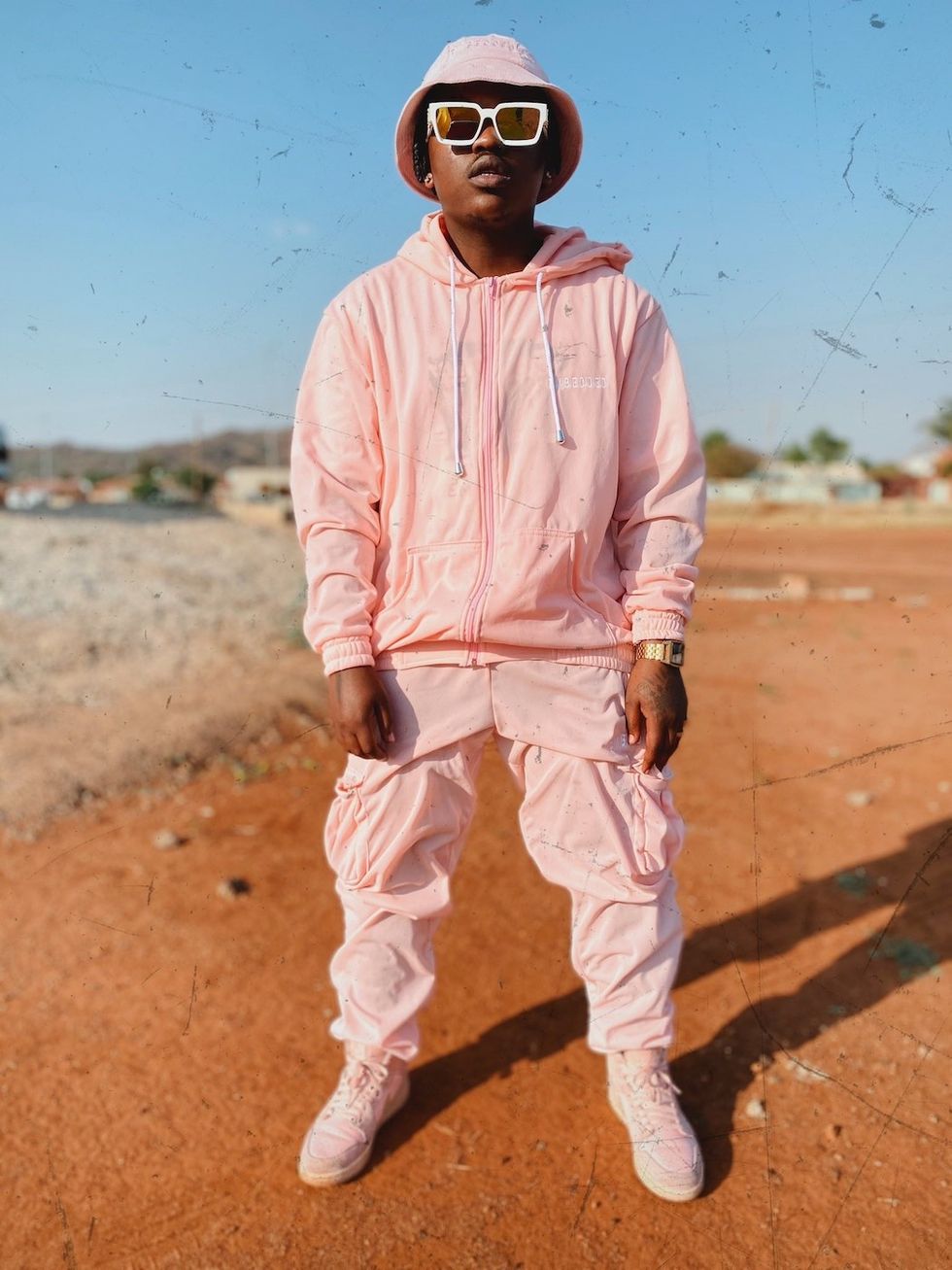Interview: Focalistic’s Blend of Hip-Hop and Amapiano Is Working
South African rapper Focalistic doesn't fixate on genre. He wants you to know his music "is for South Africans, by South Africans that sound South African."

Focalistic's sound, a blend of hip-hop, amapiano and kwaito, has made him one of the country's newest stars.
A few weeks beforeFocalistic's hit single "Ke Star" is announced to have gone gold (it has since gone platinum), a large group of school kids gather around the driver seat of the rapper's sporty BMW. "I realised that people really love him during the shoot of the 'Ke Star' music video," a passer-by says. "It was wild."
Just like today. The same group, which has now grown bigger, waits outside the spot where Focalistic will sit down for an interview. They each want a picture with one of the country's most promising rappers. They have to wait until he's done answering our questions. Asked if he enjoys being mobbed by fans, he says, "It's not like I like it. But it's something you get used to and you understand it. It's love, it's never to irritate."
Focalistic's music has the mass appeal most trap and boom bap rappers' doesn't have in South Africa, a country that's known for its affinity to dance music. Rapping over amapiano beats means he meets the people where they are—amapiano is the most popular style of house music in South Africa at the moment.
Focalistic's raps are in Sepitori—a vernacular spoken in Pretoria townships made up of a variety of South African languages, mostly Sesotho, Setswana and tsotsitaal (slang). His flows contorts accordingly to sit over the undulating beats. Hip-hop, old school kwaito and Pitori's diBarcadi house music are some of the genres he references. His music consolidates a lineage of the genres he grew up listening to. In the last three years, Focalisitc has released an impressive string of singles and EPs—Quarantined Tarantino (2020), Blecke (2020), Ase Trap Tse Ke Pina Tsa Ko Kasi (2019), 18 Area (2019)—that soundtrack his rise.
The prolific artist has already worked with artists he used to look up to; the likes of Major League Djz, Emtee, Cassper Nyovest, Vigro Deep, Mr JazziQ, DJ Maphorisa & Kabza De Small and several more.
In the interview below, Focalistic discusses working with some of his collaborators, his position in both the amapiano and hip-hop scenes, staying true to himself and more.
This interview has been edited for length and clarity.
Focalistic Ke Star (Official Music Video) ft Vigro Deepyoutu.be
Did you ever yourself being where you are today back when you started two or three years ago?
Yeah. For me, the goal is to bring the Grammy even back here.
You said in another interview that you started writing when your father died. What kind of writing was it?
It was the same thing I'm doing now. It was like, I make music about my life, from where I come from, what I'm doing right now. And it was the same thing, it was what I was going through at that time. I think I've never changed the way I think of music, it's a diary. So that's what it's been for me.
Where did you get this brilliant idea to jump on amapiano production?
As you can see, this is where I grew up, Ga-Rankuwa. The car that just passed now is playing a house song, one taxi's playing house music, the next one is playing R&B, the next one is playing something else. Amapiano is from Kwaito, so it was a natural thing. It was never a decision of let me switch bands... people make it like there's two different genres; hip hop and amapiano, for me it's never felt like that, it's one thing; good music.
When you were growing up, what kind of music were you into?
My first album that I bought was T.I's T.I vs T.I.P. And I still listen to Mujava. I used to really, really love Mujava.
You make reference to all these things in your music. Is that a conscious decision to be like, I want my thing to have this specific flavour?
I think it's because that's where it started, and that's the basis. So I can never let that go, I don't think I would have made music if certain things didn't happen in my life, if I didn't grow up here I wouldn't be the same guy. I'm that type of person and I think what makes everyone unique is your unique story, where you come from so that's where those come from.

Can you recall to the very first time when you put out a song and a lot of people knew it?
That was definitely "19 Tobetsa" with Major League. The first time we dropped that song, I'm forgetting where we were exactly, but we were out of the province, and when I got there people where like, "Oh Focalistic," [and started reciting the hook], I was like, that's crazy, I had never been to that place, but they knew the song.
How did you meet Major League? You've done a lot of stuff with them, even released an EP. Were you ever signed to them?
No. They were my mentors, there was no paperwork. I think we met over the internet, the same way I'm still doing... I posted a freestyle video and they were like, "This dope, you need to get into studio." Then there was a show by Homecoming Events called SA's Most Wanted and they were partnering with Major League and Family Tree, and I performed. I remember one of the twins was standing on the stage watching as I was performing. And he was like, that was crazy and I never thought the energy would be like that, and for me that's when I even realised, "ase trap, tse ke pina tsa ko kasi"; the streets. Our greatest power is the streets so it's never in your face, but when we pull up you will understand.
Major League DJz - 19 Tobetsa (feat. Focalistic)www.youtube.com
How does it feel to blow up and then a pandemic happens? That must be a bummer.
There's a song where I say I blew up ka Corona, so the wave is a pandemic. So for me it's like, it's still the same even after the pandemic, we'll still be doing what we have to do, touching people's hearts. I'm not that person, I never think of this might have happened and that's why "Ke Star" was dropped during the pandemic and went gold during the pandemic. So, I've always been a person of fighting the norm so yeah.
Did you ever see that song becoming what it became?
Yeah. That's why I'm saying for me I never think of the negative because I would have maybe kept the song and said people are so sad, for me I was like, let me be the light. There's a prayer I always say to God, I want to be the light in people's lives and I want to be the biggest shining star so I can shine the light back to God. And I think that's my purpose in life, so I never really worry about negative things, I pray and make a plan.
Your label 18 Area is in a partnership with Vth Season. How would you say that has benefited you that partnership?
The partnership is benefiting because you can't know everything. So, it's good to push ownership, to push being independent, but at the same time you always going to need someone who's going to tell you with their track record this is going to happen, this is going to happen. So it's been really dope, I think even Benza (co-founder of Vth Season) has become a mentor because there's so many things even about dropping music that he teaches me.
I like your tagline, "ase trap tse ke pina tsa ko kasi". But I find it funny when you're on a trap song and you still say it…
Because it's about the sound, it's not about the type of song. So when I'm on the song it will always be a song for the hood.
Do you have any opinion on how South African hip-hop sounds? And I think there's a lot of criticism, American wannabes this and that, but obviously you're that guy who's not doing that. Do you have any opinions on that?
South African hip-hop has evolved. So it's a matter of hard hip hop heads accepting, so I feel I'm doing hip-hop, but because of how people are so used to boom bap they want it to be (makes boom bap rhythm on the table with his knuckles). So, I feel it's evolved and a lot of people are fighting the evolution of South African hip-hop and that's counterproductive. So, I hear the chats, but it's like, we have "Ke Star" that just went gold in a pandemic and no one from the hip-hop fraternity celebrated that. So, it's like, you actually taking long to understand what's happening, so that's why I keep saying "ase trap tse ke pina tsa ko kasi" as a sound is going to go so far, and I hope as we grow, some people can accept that that's hip-hop. I'm rapping. It's just a matter of people accepting that it's evolving.
Did you ever struggle with flows when you started rapping over amapiano?
It was never a discussion. I was in the studio and I was trying out new things. I think that's the first day I recorded my first freestyle over an old school song, I can't remember which one. And then we realised we enjoy that more, I enjoy it more... so I'm not a person who writes lyrics, so for me it's like Jay-Z, he goes into the studio and you do four bars, stop, eight bars, and so on… That was the most natural thing when I did house beats. And then getting introduced to amapiano by Snow Deep. At the time, it wasn't even known. And he was like, "I need you to rap on this, I know you can do it", and that's what happened. That's why we're here where we are right now. It was a natural thing, I never tried to force it.

When this year started, I thought that was the direction hip-hop was going to take in SA. I really thought we're going to have more people doing what you're doing and Dr Peppa's "What It Is". [Editor's note: When this interview took place, Riky Rick hadn't released his amapiano-infused songs "Ungazincishi" and "HOME".]
I think people got very afraid. I fought through the hip-hop hard-heads, I had to fight and not even see their opinions. A lot of people [got discouraged from listening to my music] because someone would say, "But this is not real hip hop." And, in my head, I'm like, you're in South Africa, what is real hip hop here? What does it mean to me from Ga-Rankuwa Zone 2 when they're telling me about real hip-hop? It means nothing. So, I think a lot of people need to overcome... it's just opinions. So let's do it, "ase trap tse ke pina tsa ko kasi", that's a sound, you can call it whatever you want to call it, but it's music for South Africans, by South Africans that sound South African.
One of the biggest debates in music is what's better between signing and being independent? So, if a Universal or a Sony would come and be like, here's a deal, what's your response to that?
I'm not big on ownership if ownership doesn't mean anything. So, I will not want to own 100% of 0%. So, if you're a big label and you're coming to me, for me to sign that paper, you have to, one, show me that you respect what's happening, and that you have your points right and that it's going to last for the next generation. So far, no one has offered that, and that's why I'm independent, I'm not independent because I'm big on ownership of nothing, no. It has to be the right, it has to make sense.
In the projects you've released so far, which aren't albums, there's always a connection between the songs. What's album mode like for you?
I'm 90% done with album, that 10% is for what I want to change as I keep going. But album mode for me is a longer project than I've dropped, but at the same time, there's certain stories I haven't told and it's always like, "let me tell the stories the album because I want it to come full circle." I don't want to rush the come-up, I'm not in a rush, I'm not trying to be a boss, I want to be the guy who's actually not the boss, but just an inspiration and is telling his story, and that's what's going to happen. Even when I die, I want you to be able to be like, he told his story, even the embarrassing part, he told his story.
Stream his music on Apple Music and Spotify.
- Watch the Music Video for Major League DJz and Focalistic's ... ›
- Focalistic 'Quarantined Tarantino' - OkayAfrica ›
- Listen to Major League DJz and Focalistic's New Amapiano EP 'Ase ... ›
- Mr JazziQ Enlists Focalistic and Busta 929 for New Single 'Hello Mo ... ›
- Watch the Music Video for Focalistic and Cassper Nyovest's 'Never ... ›
- Focalistic 'Never Know' feat. Cassper Nyovest - OkayAfrica ›
- Focalistic Shares Visuals for 'Christian Dior' and 'Full Sette ... ›
- Focalistic's New EP 'Quarantined Tarantino' is a Satisfying Blend of ... ›
- Watch Focalistic & Vigro Deep's New Music Video for 'Ke Star ... ›
- Interview: Aymos Brings Soulful Vocals and Substance to Amapiano - OkayAfrica ›
- Listen to Focalistic’s New Project ‘Sghubu Ses Excellent’ - OkayAfrica ›
- The 20 Best Amapiano Songs of 2020 - OkayAfrica ›
- Listen to TonicMotion's 'Drums of War' EP - OkayAfrica ›
- 21 Amapiano Songs By Artists From Outside South Africa To Stream Right Now - OkayAfrica ›
- Focalistic Enlists Davido on 'Ke Star' Remix - OkayAfrica ›
- Focalistic Shares Visuals For ‘Ke Star (Remix)’ Featuring Vigro Deep and Davido - OkayAfrica ›

